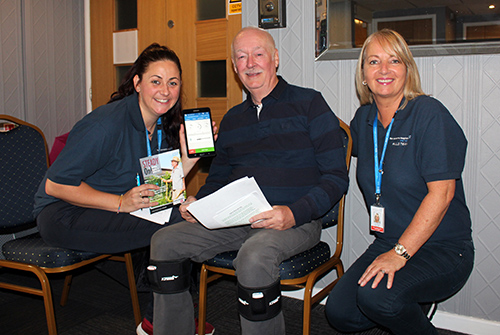
Photo: STEADY On! Team members Diane Lloyd (left) and Cathy Bolton with Poplar Social Club member Peter.
The STEADY On! Team at East Lancashire Hospitals NHS Trust’s has turned to state of the art ‘wearable technology’ to predict and prevent falls among the local elderly population.
Specifically chosen by the NHS Innovation Agency and Lancashire County Council to pilot this new technology, using QTUG™ (Quantative Timed Up and Go) the Community Falls Team based at Pendle Community Hospital are quickly and easily able to screen people for gait and mobility impairment, and identify those at risk.
Wearing hi-tech sensor pads below both knees, walking just a few steps allows the QTUG™ technology to quickly tell whether a person has a low, medium or high risk of falling.
“Falls are the most common cause of injury and hospital admission, and often happen as a result of a decline in health and fitness as we get older,” says STEADY On! Practitioner, Cathy Bolton.
“We’re now using QTUG™ as it helps to prevent falls by accurately assessing a person’s mobility and balance, it helps people when offered appropriate activities to improve or maintain muscle strength to keep track of their own improvements over a period of time ’
QTUG™ can identify specific gait and mobility problems by comparing a person’s mobility (e.g. standing, walking, turning) against average values for age and gender. The results are then displayed on a tablet device and colour coded to highlight gait and mobility problems.
Falls in older adults are a major problem in East Lancashire and worldwide, with an estimated 30 per cent of adults over 65 years of age fall each year.
“People who fall often develop a condition known as “fear of falling”, which can result in a reduction in the normal levels of physical activity,” advised STEADY On! Practitioner, Diane Lloyd.
“This leads to declining health and physical fitness which can in turn increase an older person’s risk of falling.
“In addition to the fear of falling, other psychological issues can present themselves, such as social isolation, loneliness and depression.”
Diane and Cathy will be taking the QTUG™ technology to events in Accrington, Clitheroe and Hapton in the coming weeks as they continue to help prevent falls among the elderly.
“No personally identifiable information is stored on the QTUG™ device,” added Cathy. “Just recently we visited the Poplar Social Club in Accrington and the members were queuing out the door to have their balance tested using QTUG™.”


